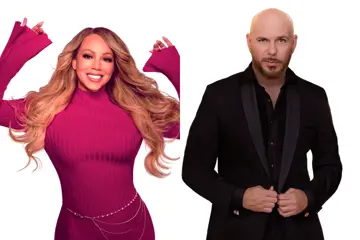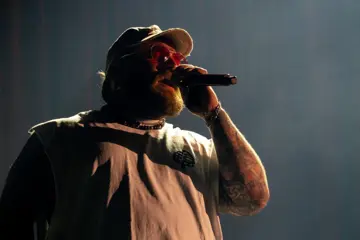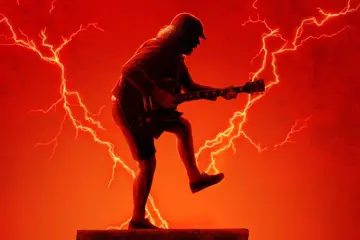 INXS
INXSManagers tend to play major roles in the careers of their acts. In the case of bands like Led Zeppelin, Skyhooks, and INXS, their public image was more that of their respective managers than the band members themselves.
Here are 12 examples where managers changed the careers of their clients.
Chris Murphy Gives INXS A Kick
After the Number 11 chart success in America of the Listen Like Thieves album and the Top 5 breakthrough of the What You Need single (1985), Michael Hutchence and Andrew Farriss started working on a follow-up where each track had the potential to be a single.
However, according to manager Chris Murphy, when he played the tapes of Kick to the Head of their US record label Atlantic, Doug Morris, he listened throughout, his eyes closed, feet on the table.
He told Murphy, “I’ll give you a million dollars to go and record another album. This is not happening, this is shit.”
The heads of Mercury in Europe and Warner Music Australia had been equally unimpressed. “What the fuck are Andrew and Michael doing?” said the Mercury guy.
Murphy refused the $1 million dollar offer. Instead, he held a secret meeting with Atlantic’s radio promo people and sold them Kick. They were impressed enough, and Murphy pulled together a sell-out tour of US colleges.
Kick cracked the college charts, picking up other radio as well, and Atlantic was forced to schedule the album for an October 1987 release.
With hits such as New Sensation, Never Tear Us Apart, Devil Inside and Need You Tonight, the album went on to shift six million copies stateside and most recently had 20 million worldwide.
Murphy said later: “I risked every dollar they had and every dollar I had on that tour. If it failed, there would have been a mutiny. It would have been the end of everything, and I knew it.”
The Rolling Stones Stay In The Kitchen
According to Keith Richards, manager Andrew Loog Oldham told them they wouldn’t survive if they just kept recording American R&B covers.
He locked him and Mick Jagger in their flat’s kitchen and told them not to come out until they’d written a number. "I want a song with brick walls all around it, high windows and no sex."
They came up with a pop ballad, As Tears Go By, which Oldham gave to his new 17-year-old signing, Marianne Faithfull, and which went Top 10. Another pop song, That Girl Belongs To Yesterday, was a hit in the UK and the US for American crooner Gene Pitney.
It took a year before the future Glimmer Twins came up with a rocker they could offer the Stones: The Last Time went to Number One in the UK, No. 2 in Australia, and Top 10 through Europe in 1965. Oldham slyly began newspaper campaigns, such as “Would you allow your daughter to marry a Rolling Stone?”, consolidating their bad boy image.
Jagger always maintained the kitchen story was not true and that Oldham threatened to lock them in, but he and Keef started writing because the Lennon-McCartney team made it look simple.
Led Zeppelin’s Game-Changing Contract
Towering at six feet and weighing 300 pounds, Peter Grant was a former club bouncer and circus wrestler. The word “intimidating” was invented for his thuggish approach to doing business for Led Zeppelin.
By 1968, the music industry was shifting power from record executives to artists. That November 11, the unknown Zeppelin signed a five-year deal with Atlantic Records’ New York offices that would become the new standard for the biz.
The 14-page document gave them an 80/20 deal and an unthinkable advance of $143,000 ($1.26 million today). Zeppelin had total control over the music, packaging and mastering. Atlantic had no say whatsoever. Jimmy Page could sack the other members, and ex-members had no right to use the Zeppelin name.
Obviously, the band themselves delivered the goods. They sold up to 300 million albums by 2018 and sold out all their tours. In 2009, when they did a one-off reunion at London’s O2 Arena, 20 million fans applied for 18,000 tickets.
The four Zeps made enormous money due to Grant. Page and Robert Plant are worth $150 million each. Stairway To Heaven made $79 million in one year alone (2016).
Grant further ensured his boys' financial protection. Bootleggers would have their records and equipment smashed. There were no polite “cease and desist” lawyer letters here.
In January 1972, Bernard Chevry, manager of the MIDEM conference, wrote to Grant, asking for "Led Zeppelin and his backing group" to appear. Grant took out a full-page ad in the trade paper Record Retailer, showing the MIDEM letter and captioning "Mr Zeppelin Regrets…”
Delta From Next Door
Glenn Wheatley discovered Delta Goodrem as a 14-year-old and set up an audition with Sony Music executives. Then-head of the label Denis Handlin signed her on the spot.
To launch her, in 2002, Wheatley landed her a role in Neighbours as singing wannabe Nina Tucker. He first heard the song Born To Try on a rough cassette and knew it would launch her career. “It was a piano ballad, it was her, and it was going to work on Neighbours. I sat down with the show’s scriptwriters and producers and thought about how it would work.
“Sony Australia was going to have her in Australia doing promotion when that episode screened in Australia.”
The episodes had her working on songs, creating a ready market. Goodrem’s debut album Innocent Eyes debuted at Number One, went on to sell a million and yielded five hit singles. Wheatley added, “When it screened in England to 10 million people, she was there, doing the promotions tour from hell. And it worked.” Innocent Eyes peaked at Number Two there.
The Angels Shadow Boxing With Crowds
When The Angels were the acoustic Moonshine Jug And String Band, they were pulling 1,000 people a night in Adelaide. To advance musically, they went electric. Within a week, crowds plunged to 200.
The band moved to Sydney where manager John Woodruff built them up with a strategy. He’d book a gig at a large club, like Sydney’s 1,000-capacity Civic or Melbourne’s 850-capacity Corner Hotel.
After 300 people, the sold-out sign would come on. The word would get around, and FOMO kicked in. You HAD to see them, AND you had to get there early.
“To me, the perception is always more important than reality,” Woodruff explained the strategy in the music business book High Voltage. “That’s why a band gets a bigger record advance or can ask for a greater fee from a club.
“So the clubs would get really crowded, and then you’d increase it to 500 people a show. And on and on. The vibe was that when you went to an Angels show, it was so packed that you couldn’t move, you couldn’t even make it to the bar to get a drink.
“The ceiling would be dripping with sweat, T-shirts would be drenched, and people would be rubbing against each other. The whole carnage left behind at the venue was the hallmark of the whole experience.”
By 1978 The Angels had become the highest paid band in the country.
How Kylie Started To Trip Around
When Kylie Minogue first went to London to record, it was done on the hush-hush and no one at Neighbours knew. Then The Loco-Motion and I Should Be So Lucky started to break, and it was obvious the show’s hectic schedule was getting in the way of promoting her music.
Her manager Terry Blamey (1987 to 2012) had come up through the volatile agency circuit, did a business degree and was the first agent to use a computer to do bookings.
He told Neighbours that one of their major stars was leaving, mechanic overalls and all. They dug their heels in and refused to let her go. Blamey stood his ground. “I had to fight her corner because they needed to keep her. She was so successful, and it was great for them.”
They eventually settled for a six-month departure date. If Blamey hadn’t pushed, it’s doubtful Minogue’s music career would have been as colossal without her devoting to it full-time.
How Troy Carter Kept Gaga’s Vibe Up
When Lady Gaga and manager Troy Carter met in 2007, they were both in a financial mess. Gaga had promised her father she’d give the music an x amount of time, and it was running out as her label, Def Jam just dropped her.
Carter had just been fired by rapper/TV host Eve and his entire empire collapsed. He lost his house and car, and his wife and mother-in-law had to pawn their wedding rings.
They were introduced by producer Vincent Herbert. She wrote great songs, but her record company, Interscope, seemed more interested in giving them away to the likes of Pussycat Dolls and Britney Spears. Carter had to stand up to the label.
His time with Eve meant he knew how to work a female act and with an understanding of fashion. Carter’s strategy was to build her up with little financial outlay. For a few years she played several club shows a night for no money. She just had the one mirrored stage costume.
At the time, Facebook, Twitter and YouTube were still new ways to break an act: they were virtually free and global. “She reached underground communities looking for new things. Ultimately it worked. It had to. I didn’t have a Plan B. Plan A had to work!”
Getting Into Shape
Stuart Cable was an early Ed Sheeran believer when record companies were still turning him down. The teenage redhead called him Dad and slept on his couch when he came to London to play gigs.
As a result, Cable said, “I don’t think we’ve ever really disagreed, not over anything major. We both trust each other’s instincts. Plus, 99 per cent of the time, we think the same way.”
But the one “clash” came when Sheeran announced he’d finished his third album ÷ (2017), with the recording of the final track Galway Girl.
He let it slip that he’d since written another song, Shape Of You, with Steve Mac and Johnny McDaid. It was first planned as a duet between Rihanna and Rudimental or a track for Little Mix.
Both Cable and Sheehan’s UK record company insisted the new song had to be on ÷.
The dancehall-dance track turned out to be a monster for Sheeran, going Number One in 34 countries, selling 41.5 million copies worldwide, and becoming one of the best-selling digital singles of all time, with 3 billion streams on Spotify by 2022.
Bruce Springsteen Finds America… And Hitsville
If there was one much-quoted review that changed an artist’s career forever, it was the one that high profile US music writer Jon Landau put pen to paper on a two-hour Harvard Square theatre show in the May 22, 1974 issue of The Real People.
“I saw rock and roll future, and its name is Bruce Springsteen. And on a night when I needed to feel young, he made me feel like I was hearing music for the very first time.”
That wasn’t the only way Landau, who became his manager and record producer, changed The Boss’ career.
Before the making of the global breakthrough Born To Run album, Landau gave him a wide collection of weighty books to read by authors such as John Steinbeck.
These shaped Springsteen’s lyrics with an understanding of America. Years later, fans and critics are still debating what it was about the lyrics that struck such a chord around America and the rest of the world.
The constant quest for freedom? An expression of a battered spirit in the wake of the Vietnam War, the end of the hippie dream and the oil crisis? Springsteen himself said, "Most of the songs are about being nowhere".
Landau stopped Springsteen from giving Hungry Heart to The Ramones, whose gig at the Fast Lane in Asbury Park inspired him to write it.
When he first heard an early version of the Born In The USA album, the manager/ producer said it lacked a hit single.
Dave Marsh’s book Glory Days records that Springsteen’s initial response was an irritated, "Look, I've written seventy songs. You want another one, you write it."
But he came up with Dancing In The Dark overnight. After six tries, it was recorded on February 14, 1984.
It became the album’s lead single and the Boss’ biggest single, a top 5 single in nine countries, including the US and the UK. In Australia, it became the biggest single of 1984 after selling close to 500,000 copies.
It won him his first Grammy. It also propelled the Born In The USA album to world smash status, selling 30 million worldwide by 1987 and becoming one of the best-selling records of the rock era. It topped the charts in nine countries, including Australia, where it sold close to 1 million.
Finding Skyhooks’ Million Dollar Riff
Ross Wilson noticed Skyhooks when they opened for his band Daddy Cool at a mid-winter gig at Melbourne University. They’d only played their first show three months before.
He loved their songs, and how they polarised the crowd with their bratty behaviour. He became a constant figure at their shows, and signed Greg Macainsh to his own publishing company Doo Dah Music.
He got them a deal with Michael Gudinski’s fledgling Mushroom Records. Gudinski would also become the ‘Hooks manager.
Wilson felt he was the best person to produce the first Skyhooks album. There were a number of problems. One, he’d never produced an album before. Secondly, Mushroom had not had a hit for ages and was close to toppling over.
“It was a leap of faith on Michael’s part,” Wilson remembered. “He said, Can you keep it down to 100 hours and I said I don’t know, I’ve never produced an album before. I’ll try and keep it down but don’t hold me down to that.” To their credit, Mushroom executives never interfered during the recording although they must have been super-nervous.
Living In The Seventies took 200 hours to record and cost $13,000 (about $1 million in today’s money). But it was released to phenomenal success, selling 250,000 copies (at the time unheard of for an Australian band) and staying at Number One for 16 weeks.
For Gudinski, putting that trust in Wilson pulled Mushroom out of the hole, and it went on to become a formidable global label.
Tina Turner’s Revival
By 1984, the song What’s Love Got To Do With It had been turned down by Donna Summer and Cliff Richard. It was co-written by Los Angeles-based Terry Britten, who started out in Australia in the ‘60s as a guitarist with The Twilights.
Tina Turner, then 44 and considered past her use-by date, wasn’t too crazy about it either. But her young Australian-born manager Roger Davies knew it was a hit. During the days when he took Sherbet to the top, he had an instinct for what worked on radio. He moved to Los Angeles and looked after Olivia Newton-John, Cher, Mick Jagger and Joe Cocker.
Davies insisted that Turner record the song. It proved a massive comeback, Turner’s first Number One in America where it sold 2 million and became her signature tune. It won three Grammys. It stormed her back in Europe and was a Number One hit in Australia.
Years later, Davies would also coax Olivia Newton-John into recording Physical despite her initial doubts about the song’s worthiness.
Hell’s Bells
In the winter of 1979, AC/DC’s manager, Michael Browning, was summoned to the New York headquarters of the band’s US label, Atlantic Records, Rockefeller Plaza.
The meeting was with company president Jerry Greenberg and head of A&R Michael Kleffner. The topic for discussion was AC/DC’s inability to break the American market and the possibility of dumping Bon Scott and replacing him with a singer more suited to American radio.
“Not in a blunt ‘either do it or we drop you’ type way,” Browning told Classic Rock later. “But there was that kind of conversation going on.”
Browning outright refused this course of action, and Scott was safe.
Kleffner then suggested they get an American producer, Eddie Kramer (Jimi Hendrix, Zeppelin, KISS). But this meant they had to drop Angus and Malcolm Young’s big brother George, who had been a mentor to them from the start and co-produced with Easybeats colleague Harry Vanda their early records.
“It was obvious something had to be done,” according to Browning. “George had been fabulous for them, but he hadn’t been to America for years, and American FM radio had a sound you had to experience to really understand.”
The Kramer sessions were a disaster. The Youngs were furious over the decision made over their brother, Bon’s drinking was getting worse, and Kramer had even suggested they do a cover – a ‘60s hit by Britain’s Spencer Davis Group, either Gimme Some Loving or I’m A Man.
An angry Malcolm rang Browning, snarling, “The guy’s hopeless, do something!”
Browning opted for Mutt Lange, an African-born guitarist who had produced Boomtown Rats’ I Don’t Like Mondays. “Who’s he?” Malcolm grunted. “He’s a genius” Browning calmed the brothers down. If they’d known about Mondays, they wouldn’t have allowed him near them.
While Vanda-Young had gone for a ‘feel,’ Lange was a perfectionist. That didn’t go well with the Youngs, especially as he changed their music and even gave it a bit of a groove.
Lange won their respect. Against Angus’ initial cynicism, he taught him to do the solo for the track Highway To Hell, showing him where to place his fingers on the fretboard.
The Classic Rock piece also had tour manager Ian Jeffrey explaining how when an out-of-shape Scott was trying to sing If You Want Blood, there was more breathing than voice.
Lange told him, “Listen, you’ve got to coordinate your breathing.” Scott’s response: “You’re so fucking good, cunt, you do it!” Still seated on his chair, Lange – a trained singer – showed him exactly how to do it.
Instead of the two weeks it took AC/DC to make an album, the resulting Highway To Hell took almost three months. Songs were reworked continually, and sessions dragged on for 15 hours. Lange got the best sounds possible out of AC/DC.
When it was released on July 27, 1979, Highway To Hell did the job. It cracked the American Top 20, where it shifted seven million copies, and shot them into heavy rock legendom. It was their first Top 10 in the UK and peaked at Number 13 in Australia, where it was certified 5 x platinum for sales of 350,000.
Michael Browning’s choice of Lange worked. But that decision to agree to drop George Young would eventually cost him his job with the band. Seven months later, Scott had died of a misadventure.






